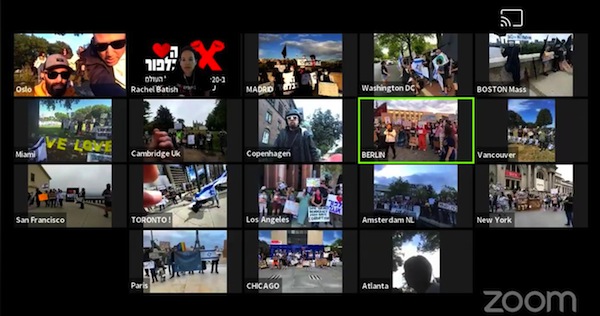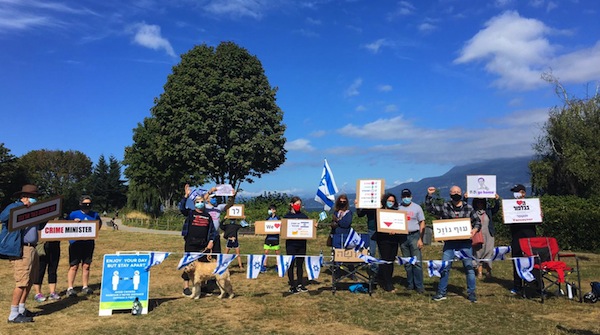Local Israeli Jews gathered at Vancouver Maritime Museum Aug. 29 to join groups around the world in supporting rallies in Israel for democracy. (photo by Zohar Hagbi)
In recent years and with greater intensity during COVID-19 and the current “emergency” coalition in Israel, many believe that the foundations of Israeli democracy are being challenged by a prime minister indicted on several criminal counts. On Aug. 29, several dozen Israeli expats, members of the Metro Vancouver Jewish community and others joined compatriots in 18 cities around the world to support the growing protests in Israel.
Hundreds of supporters, standing in unison with protesters in Israel, took a stand at their respective locations in Atlanta, Amsterdam, Basel, Berlin, Boston, Cambridge, Chicago, Copenhagen, Los Angeles, Madrid, Miami, New York, Oslo, Paris, San Francisco, Toronto and Washington, D.C. Another Canadian city, Calgary, has held a rally or two. On other weeks, protesters as far as Sydney, Australia, have expressed their support.
From the outset, Vancouver organizers drew inspiration and guidance from UnXeptable, a grassroots movement launched by a group of Israelis residing in the San Francisco Bay area. This tightly knit, completely self-funded team of volunteers put together position papers, crafted marketing materials and created social media channels that seeded the formation of similar groups dotting Western Europe and North America.
The prime minister’s official residence is located on Balfour Street in Jerusalem, making it and the neighbouring squares and streets the epicentre and namesake of the protests. Meanwhile, thousands of miles away from Jerusalem, the more serene and isolated location of the Vancouver Maritime Museum served as our venue. It was the third time we have come together to hold signs, wave the Israeli flag, chant and sing in solidarity with the countless protesters, of all stripes, on the ground in Israel. In contrast to local gatherings in previous weeks, this global rally saw a significant increase in participation. Whether this was due to the broad media coverage of police violence at Balfour the week before, the global nature of this particular event, or the remarkable planning, the result was a palpable level of energy and a sense of unity.
It was a windy day, which forced us to relocate from our usual spot on the north side of the museum to the warmer grass at the front of it. The venue was chosen over more central locations out of consideration for the safety of the people involved and other sensitivities. The goal of our gathering was, after all, to support the people in Israel, while reducing the chance of friction with anti-Israelis or with those who would mistakenly claim that our actions were akin to “airing dirty laundry.” Over the years, Israelis living abroad have faced significant pushback from many parts of the Diaspora community who have had difficulty understanding and accepting their criticism of Israel. As Diaspora Jews and others learn more about the serious challenges that Israeli society faces today, they may become a little more sensitive to the internal conflicts of many Israelis living abroad – people who have given some of the best years of their lives to defending the country they love and who are genuinely concerned by what is currently taking place.
Assembled in the various cities for more than an hour, the Vancouver group joined their peers around the world in a simultaneous Zoom-powered broadcast of the rally, dubbed “Halev BeBalfour” (“the Heart is in Balfour”). This coordinated event, quite possibly the first of its kind in Israeli history, took place at precisely 9 p.m. Israel time, was streamed on the new independent channel DemocratTV and, most importantly, screened on the side of a building at the neighbouring Paris Square for the protesters to see. During an allotted two minutes, each location was given the opportunity to express its support through speeches, chants or songs. As the cities took their turn, Paris with the Eiffel Tower in the background, Berlin with its Brandenburg Gate, San Francisco with the Golden Gate and so on, Vancouver had its share of the focus.

Anyone who is interested can watch the video, available on DemocratTV’s Facebook page. It shows how Israelis worldwide have joined together to express their concern about the situation in Israel. In the video, you can hear people from Vancouver speaking about the need for the Israeli people to come together again and recover from the many years of divisiveness, the culture of corruption and the fear-mongering. The Vancouver group ended its two-minute segment calling for internal peace, and singing the late Arik Einstein’s “Ani Ve’ata Neshane et Ha’olam” (“You and I Will Change the World”) and “Kol Ha’olam Kulo Gesher Tzar Me’od” (“The Whole World is a Very Narrow Bridge”).
It’s no secret to anyone following Israeli news that, in past years, the country has suffered from growing internal tensions and political instability, which resulted in three elections within the span of a year. Those who yearned for a seemingly never-ending political deadlock to be broken and new national leadership to emerge in the March elections, from the combined front of Yesh Atid and the Blue and White party, were left disappointed. These voters reluctantly had to watch Binyamin Netanyahu dismantle the opposition and form what is quite possibly the most dysfunctional and largest government in the nation’s history, with a pandemic serving as its backdrop.
The focus and efforts required to address the deepening Israeli tribalism gave way to the government’s concerted fight against the virus. Israel, which was considered a role model of how to handle the health crisis by some countries early on, largely due to its aggressive lockdown, is now experiencing widespread infection. What remains from the unprecedented civilian cooperation at the start of the pandemic is record unemployment, thousands of closed businesses and a growing distrust in the motives of the country’s leadership.
As Israeli society is quite likely on the brink of a new lockdown, more and more Israelis of all political persuasions are demonstrating their frustration with the mismanagement of the crisis, their concerns for the future and their anger against corruption at the highest echelon of government. After years of ongoing investigations and constant delays, with the outcome of investigative case No. 3000 (aka the “Submarine Scandal”) still pending, Netanyahu was indicted in October 2019 on three counts of bribery, fraud and breach of trust.
Demonstrations, rallies and marches spanning hundreds of locations in major cities, road junctions and highway bridges near the prime minister’s private residence in Caesarea and in Balfour itself have consistently grown in attendance, culminating in weekly events at the end of Shabbat since June. Fueled by the unity of more than 20 grassroots movements, notably Ein Matsav (Unacceptable), Protest of the Individuals, Crime Minister, and the Black Flags, the assembly at Balfour drew an estimated 45,000 marchers and protesters at the end of August, much higher than the numbers reported by major media outlets such as Walla News and Ynet. While the protesters appear to come from all political factions, age groups, religious backgrounds and Jewish ethnic divisions, Netanyahu and his supporters have referred to them as “anarchists,” “aliens” and even “traitors.”
It’s quite possible that by the time you read this, the outcomes of the protests, the fragile political balance and the situation of the health crisis in Israel may be quite different. What won’t change, with time or distance, is that Israelis around the globe will continue their struggle to protect democracy. Our hearts remain with the people of Israel.
Adi Kabazo and his family moved to Vancouver from Israel in late 2002, when daughter Hilla was less than a year old. A high-tech marketing professional by trade and hummus maker by hobby, he keeps a close tab on Israeli affairs. The connection with Israel and sense of the obligation to uphold and protect Zionist and Jewish values is shared by Hilla, a first-year arts student at the University of British Columbia. Hilla has a strong interest in social justice and is an active member of the Camp Miriam community, as a volunteer and in her role as a summer camp counselor.

